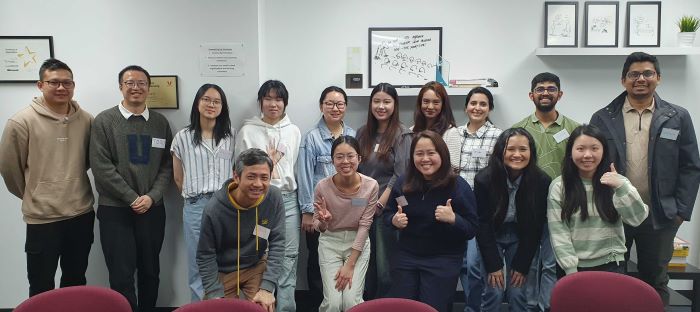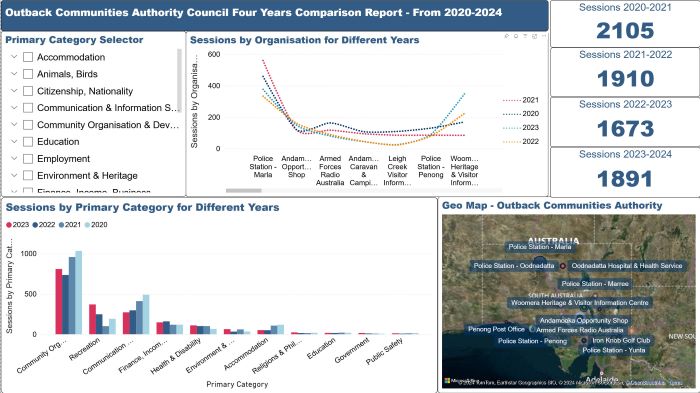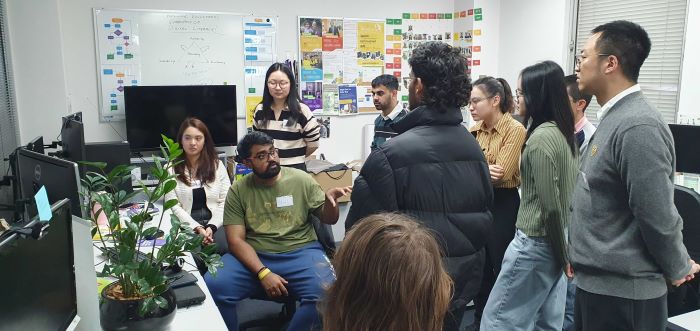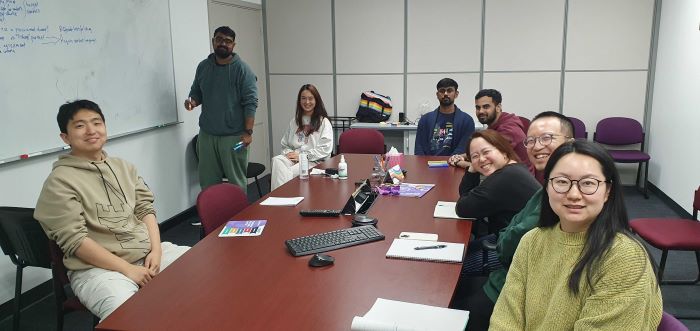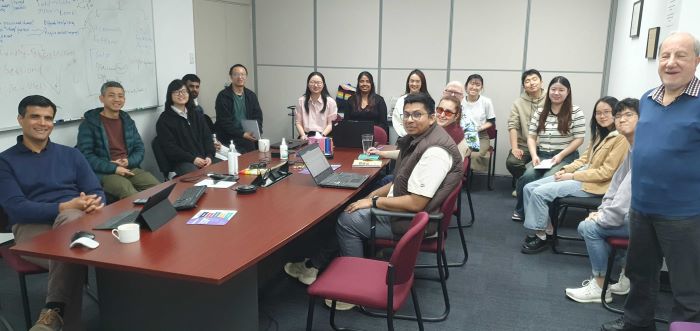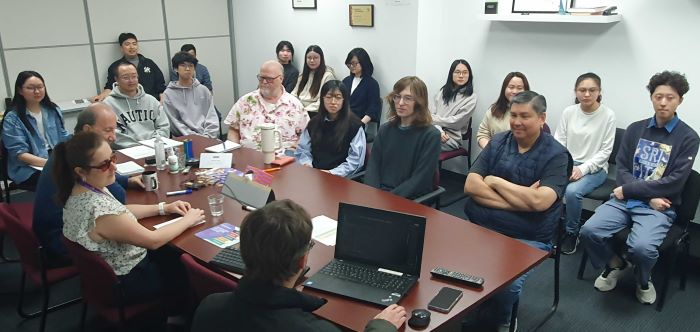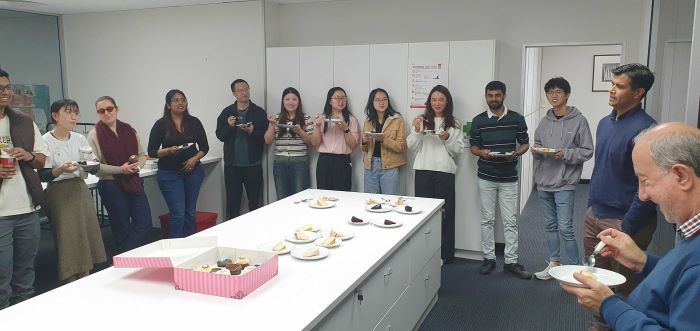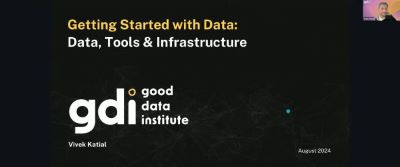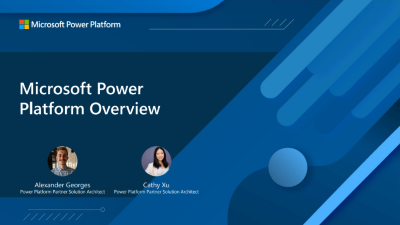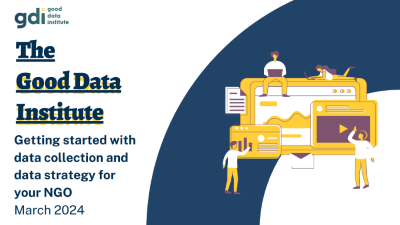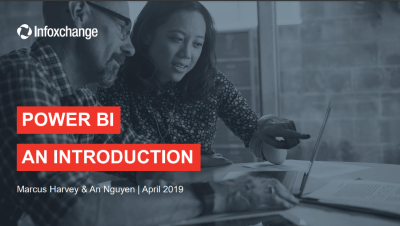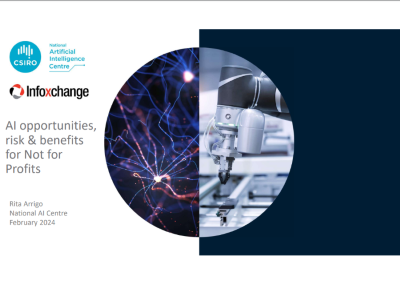Adelaide University Internship Experience - Todd Guanhua Tao

He completed a 280 hour internship onsite with SAcommunity at the Connecting Up Office, Infoxchange for 3 days (22.5 hours) a week for ~14 weeks around his classes.
Todd returned as a volunteer to Connecting Up on 3rd of December 2024 to continue to further investigate and build his skillset in Data Analytics whilst working part-time, and let us know on 13 October that he will be continuing his studies.
"I’m pleased to share that I will be starting a PhD in Landscape Architecture on 15 October 2025 at the newly formed Adelaide University. I have to say, what I learned at Connecting Up has been incredibly helpful in this journey—especially the oral presentation skills and daily communication with peers and colleagues. These experiences gave me the confidence to introduce myself and present my research to potential supervisors. I’m truly grateful for your guidance, and for the valuable opportunity that Connecting Up provided me." ~ Todd 13 October 2025Total Hours 344 This Year 45 Joined 13 August 2024 Last Check-in 21 May 2025 (Retired)
He joined the Connecting Up Data Analytics Team and the SAcommunity Website Redevelopment Team to follow his passionate goal of acquiring skills in Data Analytics and Full Stack Development. Todd aims to gain a deep understanding of Data Analytics tools such as Power BI and Google Analytics, while also refining transferable skills like project management and design from his previous experience.
There are a number of steps involved in the creation of community service information data presentations. A summary of data trends prepared, using information from Google Analytics and SAcommunity with subsequent Power BI and Canva reports revealing data anomalies and corrections required, the database is updated and reports re-created with improved information. Final data reports are published to the website, and introduced by Todd to Outback Comminities Authority council stakeholders for information and/or feedback on 15 November 2024.
Todd participated in developing a Python script for cleaning raw data extracted from GA4. This project was a collaborative effort involving Todd, Neil, Mihir, and Jason. Todd's role was to compare the data cleaning results generated by the script with the manually checked results for the OCA dataset and conduct testing. The script significantly reduced the workload for interns and volunteers in cleaning raw council data.
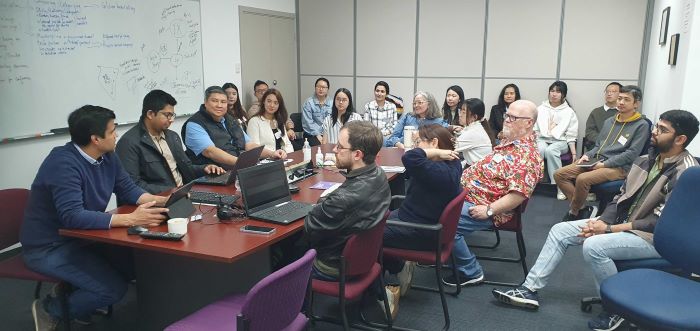 Connecting Up Monthly Meeting with guest Kylie Love - Senior Human Resources Business Partner at Infoxchange, Tuesday 13 August 2024
Connecting Up Monthly Meeting with guest Kylie Love - Senior Human Resources Business Partner at Infoxchange, Tuesday 13 August 2024
Relevant meetings Todd has attended include:
Specifically, during the meetings, Head of Connecting Up, Pankaj Chhalotre, first summarizes the core tasks and their status from the previous stage. This allows interns to better understand the organization’s objectives and the team’s current main tasks, helping them clarify their own development goals. In the staff meetings, every full-time employee provides a detailed work summary, which is an efficient and direct way for interns to familiarize themselves with team members.

Volunteers and interns both prepare 5 questions for their mentors and then are encouraged to record 5 aspects they felt were helpful for them to share on their portfolio for both them and other volunteers, and Todd shared his experience in meeting Cameron Brown, experienced 7-year Web Developer, Infoxchange.
Career Insights:
Then, when asked, "If you could go back to the start of your career in web development, what do you wish you had known? What tips would you give to someone just starting out?", Cameron responded that he wouldn’t be as nervous or scared about trying to excel and get everything right from day one. He would also not be afraid to make mistakes and ask lots of questions.

 Innovation at Infoxchange on 25 September 2024
Innovation at Infoxchange on 25 September 2024The webinar offered insightful information about the connection between diet and mood, along with practical tips for improving my eating habits. Elaine Fox passionately introduced a variety of healthy dietary options and emphasized the importance of choosing minimally processed foods.
Key takeaways included her advice to consume moderate amounts of high-quality proteins such as seafood, lean meats, and dairy while limiting highly processed foods. She also recommended aiming for five servings of vegetables and two servings of fruit daily, as well as incorporating Omega-3 fats from sources like fish and nuts to promote brain health. One particularly valuable point was her caution about calorie-dense yet nutritionally poor foods, which may temporarily enhance mood but often lead to overeating and long-term health issues.
Overall, the webinar was both engaging and informative. It deepened my understanding of how food choices affect overall well-being and inspired me to reassess my diet and adopt a healthier approach.
Jo Davies shared her definition of innovation, stressing that it is not merely an expression of creativity but a process of turning ideas into concrete actions. She outlined several types of innovation, including incremental and disruptive innovation, providing examples such as Airbnb and Netflix to illustrate these concepts. Additionally, she explored how collaboration and process innovation can boost efficiency, ultimately helping to achieve organizational objectives.
Key takeaways from Todd:
Through this webinar, firstly, I gained a deep understanding that innovation is not just about coming up with new ideas, but more importantly, about putting those ideas into practice to create tangible value. Secondly, Jo Davies emphasized that innovation is an ongoing process that requires us to continually adapt to the evolving needs of the market. Thirdly, the most important takeaway is that I now understand that IX's innovation is divided into three phases.
The Three Horizon Model shows that in the current phase, we focus on product and service innovation, such as client management and managed IT services. In the near term, we plan to focus on innovations like the data warehouse and AI applications. In the future, IX will prioritize innovations related to the Digital Future Fund. This gives me a clearer understanding of Infoxchange's developmental goals at different stages. This webinar made me reflect on areas in my daily work where I can apply innovation to optimize processes and eliminate "human duct tape fixes."

c. Data Catalyst Network (DCN) September Webinar | Working with Government data - Lessons from the Learning for Life program
A key aspect of the program is the use of data to provide timely and targeted support. The Smith Family has partnered with the South Australian Department for Education to gain access to key educational data in real-time for students on their program. This data includes attendance, achievement, and behaviour management incidents, which are updated daily. This allows Learning for Life team members to support students and families as issues emerge, helping to identify and address problems early on.
Key takeaways from Todd:
b. Clear Value Proposition and Data Security: When working with sensitive data, especially in government partnerships, it's important to clearly define the value proposition for all parties involved. Additionally, ensuring robust data management practices, such as verifying who has access to the data and maintaining security standards, is essential for building trust and ensuring successful collaboration.
c. Consent and Trust from Stakeholders: A significant part of the discussion highlighted the importance of obtaining consent from families and stakeholders, especially when dealing with sensitive data. The high level of trust from families, as demonstrated by a 95% consent rate, shows that when stakeholders believe data will be used to benefit them directly (such as improving educational outcomes for their children), they are more likely to participate in data-sharing initiatives.
d. Cake and Connect - R U OK? DAY on 10 September 2024
Attending R U OK? Day provided a meaningful reminder of the importance of staying connected and checking in with those around us. The event emphasized the crucial role of having regular, heartfelt conversations to support anyone going through a challenging time. It reinforced the idea that asking “Are you OK?” should become a natural part of our everyday interactions, ensuring that people feel valued and supported, whether their struggles are big or small.
The Cake and Connect session was both delightful and insightful. Sharing cakes and engaging in casual conversations created a friendly and relaxed atmosphere. On top of that, we picked up some useful tips for boosting our physical and mental health, like getting some morning sunlight and taking a cold shower to invigorate ourselves. These little changes can make a big difference in how we feel day-to-day.
The opportunity to genuinely check in with one another was invaluable. The session was a reminder that reaching out should extend beyond the event itself. It’s essential to check in not only with colleagues but also with our families and friends. The day underscored that genuine care and connection can happen at any time, and that is something we should carry with us every day.
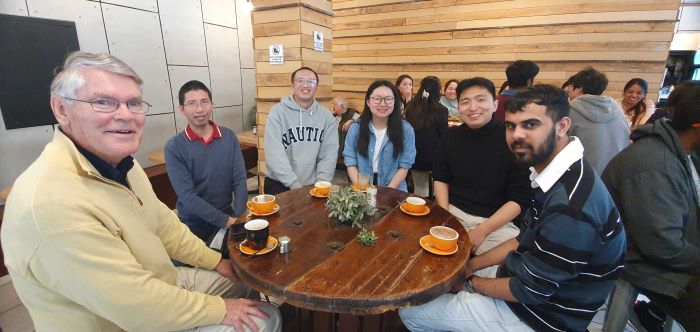 Infoxchange Mental Health Week Event & Connect Day 10 September 2024
Infoxchange Mental Health Week Event & Connect Day 10 September 2024
e. World Mental Health Day Networking Activity
During Mental Health Awareness Week, volunteers and interns were encouraged to have coffee chats with ConnectingUp full-time staff. The event focused on boosting mental, social, physical, and financial health through various activities. Staff were invited to enjoy a free coffee break as part of the initiative to enhance social well-being. This provided a relaxed environment for meaningful conversations and connections among colleagues Ivy, Aaron, and David. The activity created an opportunity to step away from work, recharge, and foster stronger workplace relationships. During the discussion, we talked about culture, food, and the challenges we encountered at work. This event was a great way to connect, communicate, and reduce mental stress.

Section D: Digital Training and Development
Volunteers and interns have access to the Connecting Up Digital Learning Platform providing live webinars and recorded webinars, workshops and webcons presented by subject-matter experts to understand more about a range of technology topics for the not-for-profit sector.
Relevant training sessions were selected, attended, summarised and assessed by Todd to look at how these sessions can enhance his internship experience have included:
This webinar was presented by Vivek Katial as part of the Data Catalyst basic webinars series. Vivek Katial is the Co-Founder and Executive Director at Good Data Institute, which works with not-for-profit organisations to help them elevate their data capabilities.
Key Takeaways from Todd:
a. The Data Project Lifecycle: Analytics projects follow a structured lifecycle starting with defining objectives, gathering and cleaning data, analyzing insights, and implementing actions. Clear goals and clean, actionable data are essential for meaningful outcomes.
b. Handling Messy Data: Poor data quality leads to inaccurate insights and wasted resources. Standardizing data entry, regular cleaning, and automating processes can help mitigate common issues like typos, inconsistent formats, and missing information.
c. Ethical Considerations in Data: Ethical data collection requires awareness of inherent biases, which can skew insights and recommendations. This is especially critical when analyzing datasets that disproportionately represent economically developed regions.
2. PowerApps – capture NFP data & digitise workflows without coding
This webinar was presented by Cathy Xu and Alexander George, both are skilled Power Platform Architect and Trainer at Microsoft, This course is designed to teach participants: Functionality and capabilities of Microsoft Power Apps, Developing Power Apps for various purposes, and Creating workflows and automating processes using Power Apps.
Todd Guanhua Tao Certificate of Completion
Key Takeaways from Todd:
a. Through the webinar, I learned that Microsoft Power Platform combines low-code tools like Power Apps, Power Automate, and Power Pages to help organizations build apps, automate workflows, and create modern websites with minimal technical expertise.
b. The presenters demonstrated a typical workflow using Power Apps, but I need to come up with my own business idea to apply the tools effectively. The idea is the most crucial part.
3. Getting started with data: Strategy and collection for your NFP
Karma Effect, and KiwiBots. The aim of this webinar is to help juniors learn how to empower their NGOs with the tools needed to kick-start their data journey.
Todd Guanhua Tao Certificate of Completion
Key Takeaways from Todd:
a. My reflection is that a well-defined data strategy begins with clear objectives and an assessment of an organization's data maturity. This includes identifying the goals, fostering a data culture, and ensuring that the project scope aligns with available resources to create a sustainable impact.
b. Embedding ethical considerations into data collection is critical for unbiased and meaningful insights. Organizations must address potential biases during data analysis, especially when comparing datasets from varying socio-economic contexts, as these biases can significantly influence decision-making and outcomes.
c. Digitizing workflows and leveraging automated data collection processes, such as using Google Forms, can streamline operations while reducing manual errors. This approach not only saves time but also supports creating a unified 'single source of truth,' enabling accurate and actionable data-driven decisions.
4.Gain a clear understanding of your organisation's data and impact using Power BI
Marcus Harvey, the head of Infoxchange's IT consulting and services teams in Australia and New Zealand, held this webinar to provide valuable insights into the relationship between data analysis and non-profit organizations (NFPs). Marcus presented a potential pathway for NFPs to extract more insights from their data, gain a deeper understanding of their clients, and identify current service gaps, enabling them to work smarter, not harder, and achieve measurable outcomes with the clients and communities they serve.
Todd Guanhua Tao Certificate of Completion
Key Takeaways from Todd:
c. Thirdly, I realized that the choice of data and tools largely depends on the type of services provided by the NFP and its organizational goals. These are just tools, after all. The true value of data analytics and the discovery of potential insights still rely on correct human decision-making.
5. AI opportunities, risks and benefits for NFP's
This session will include a journey into what AI, Machine Learning and Computer Vision is through to Generative AI including key examples for not-for-profits. The presenter, Rita Arrigo is the Strategic Engagement Manager at CSIRO National AI Centre, focused on leading ecosystem strategy to foster engagement and collaboration across AI to lift Australia’s global AI leadership on commercialization and adoption.
Todd Guanhua Tao Certificate of Completion
Key Takeaways from Todd:
a. Generative AI's Transformative Potential for Nonprofits: AI tools, including generative AI, offer substantial benefits for not-for-profits by automating tasks like content creation, grant writing, and stakeholder engagement. These tools enhance productivity, reduce operational costs, and improve accessibility and inclusivity, making AI a critical co-pilot in modern nonprofit operations.
b. Responsible AI Adoption and Ethics: Australia is emphasizing the responsible use of AI with frameworks like AI Ethics Principles and initiatives such as mandatory guardrails and voluntary safety standards. These measures aim to balance AI innovation with privacy, fairness, and transparency to safeguard societal and environmental well-being.
c. AI for Community and Environmental Good: Case studies like Healthy Country AI and AI-powered conservation tools demonstrate how AI can address pressing challenges such as ecosystem health and cultural engagement. These applications showcase AI's potential to drive meaningful change beyond traditional organizational objectives.
Final reflections and Career goal
I would like to demonstrate this section in the following aspects: 1. Technical and personal achievements. 2.Reflection about the weaknesses. 3. Impact on my career goal.
1. Technical and personal achievements.
During my internship, I was tasked with a wide range of activities, including developing my personal biography and portfolio, participating in career development activities, contributing to the Community Services in Councils Project, attending internal and external events, building connections and networks, and undergoing digital training and development. Each activity was tailored to support the development of both interns and volunteers. I approached these opportunities with a proactive mindset and successfully completed most of them on time.
The most significant achievement of this internship was publishing the Outback Communities Authority (OCA) organization web service report on the SAcommunity Website and delivering the report to the OCA representative. This accomplishment stood out as a pivotal contribution to the organization and highlighted the practical impact of my efforts.
2.Reflection about the weaknesses.
During this internship, I identified several personal weaknesses that affected my ability to work effectively in an Australian company. The most significant challenges were the language barrier and my coding proficiency. As English is my second language, I realized I need to invest more effort than my peers to communicate effectively. Moreover, my limited understanding of technical terminology and abstract expressions further compounded this challenge.
In terms of coding, my lack of prior experience placed me at a disadvantage compared to peers with more technical backgrounds. This weakness became particularly evident during my role at ConnectingUp, where technical proficiency was essential. Addressing these areas will be a top priority as I move forward in my career.
3.Impact on my career goal.
My career goals have evolved significantly over time. With a background in landscape architecture and data analysis, I initially aspired to create innovative designs, achieve recognition, and earn awards for my team. However, I eventually realized that the most rewarding aspect of my work was the interaction between designed spaces and the people who engaged with them. This realization led me to explore ways to quantitatively analyze and enhance these interactions, shifting my career focus.
This internship played a crucial role in refining my career direction. Many of my tasks were closely tied to community-level matters, granting me valuable access to community data. I found the work both challenging and enjoyable, and I delivered tangible results. Through this experience, I discovered that community-level data analytics resonates more with my interests and skills than analyses at urban or national levels. My current career goal is to leverage data-driven insights to enhance the interaction between communities and designed spaces. This internship provided clarity and a strong foundation for this pursuit.
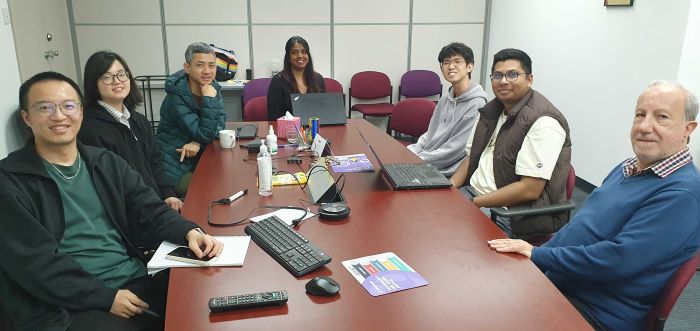
SAcommunity Website Rebuild Team:
Sign up for the newsletter!
Subscribe to our monthly newsletter to receive news, information and events for the community sector in SA.




